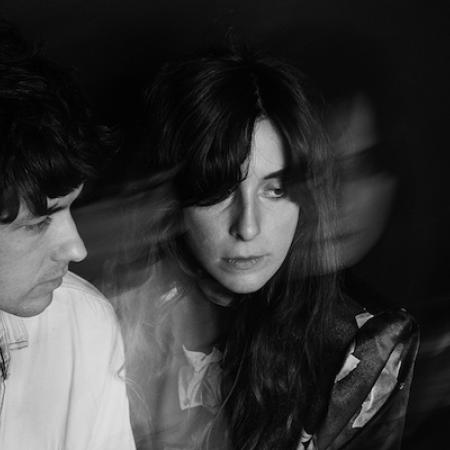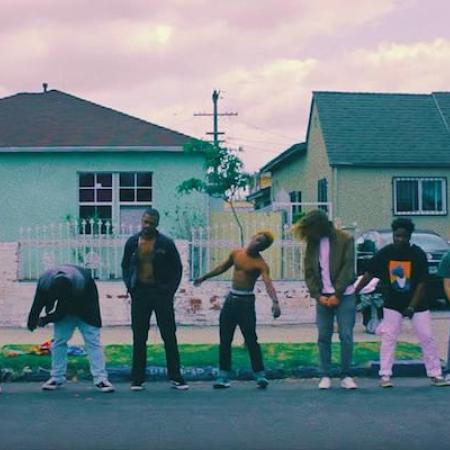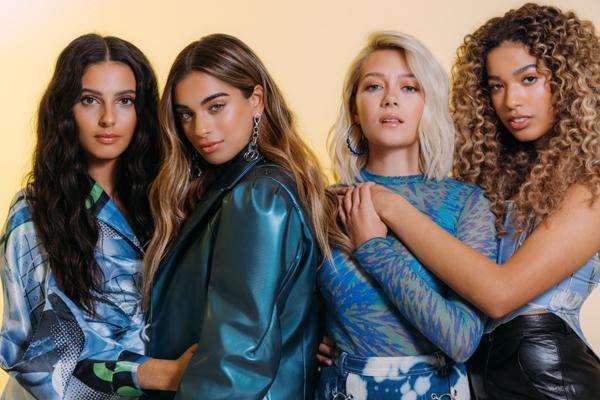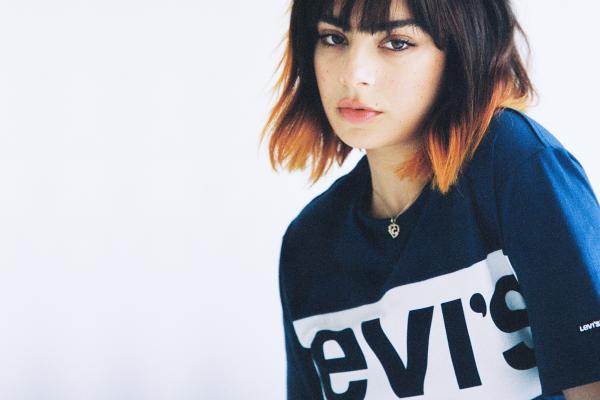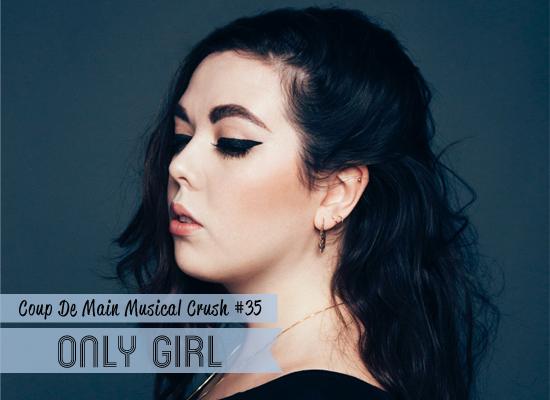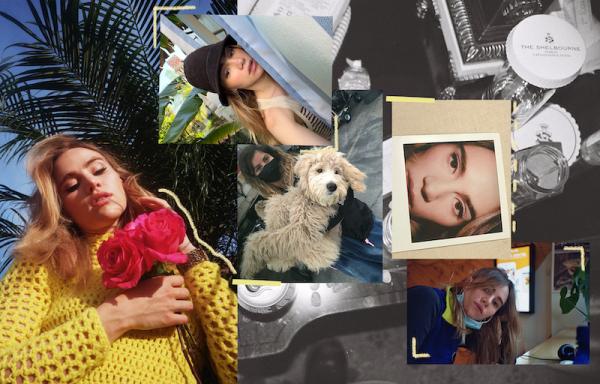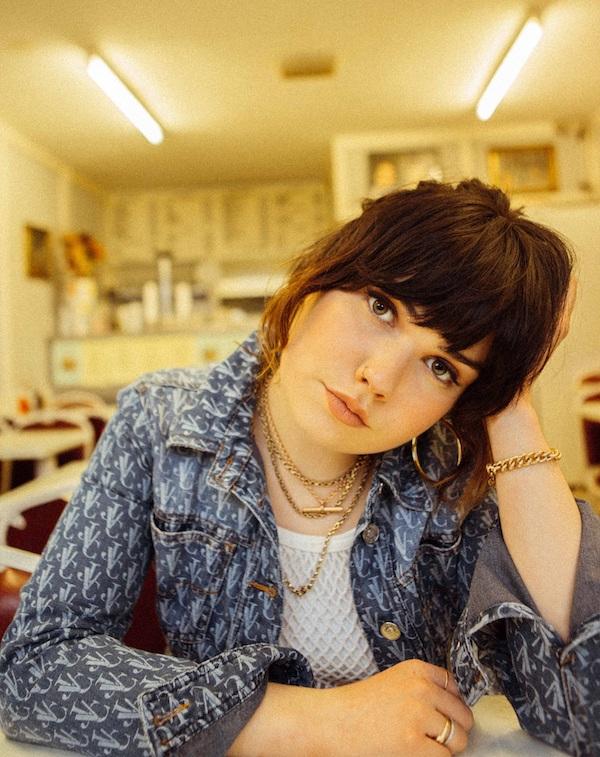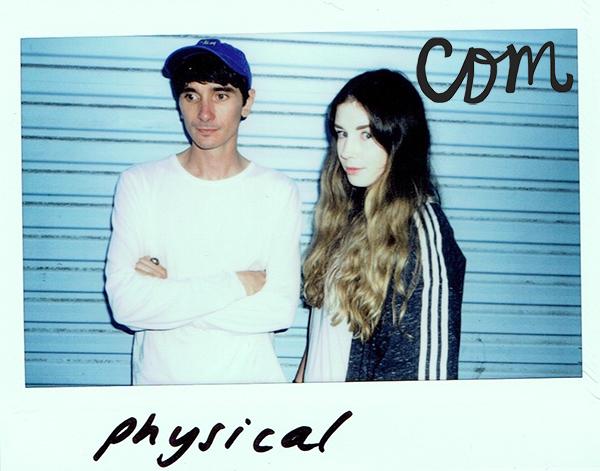Marika Hackman isn’t your man anymore. Her second studio album, the follow up to 2015’s ‘We Slept At Last’, is the sound of someone casting off everything that held them back from being their best self, including – but not limited to – secrets, managers, metaphors, misogynists, and fear. Re-teaming with producer Charlie Andrew, also known for his work with alt-J, she enlisted the help of her pals The Big Moon as a backing-band for a record that’s designed to feel live, as if when you put your headphones in, you’re tuning into a live-stream from the studio.
Ahead of the June 2nd release of ‘I’m Not Your Man’, we recently chatted to Hackman on a spring day in East London, basking in the surprisingly bright sun (although she’s not a fan of hot weather due to her preference for wearing layers). “I really want people to hear this record, I’m really ready for it to come out now,” she tells us towards the end of a conversation during which topics range from her new approach to recording, the impact that lyrical honesty can have on her fans, and learning to accept her love of a great pop song.
I had an experience: I’d already written the record in that mindset and I was at one of my girlfriend’s shows and a fan came up to the both of us and she said that [we] had both helped her to come out to her parents. She was crying, but in a really amazing way. It kind of validated everything I’d been thinking about this record going into writing it and I was like, I’m really fucking happy that I have been this frank and honest about stuff.
COUP DE MAIN: One of the first things I noticed listening to ‘I’m Not Your Man’ was the number of songs that mention mouths and tongues. I counted seven. Aside from just nouns, the album is full of mouth-based verbs, opening with a laugh and ending with a song about vomiting. Why was this the central motif that you chose for the record?
MARIKA HACKMAN: I don’t know if it was a choice. I think it happened by accident. I’ve always been a little bit obsessed with mouths. I sucked my thumb for a really, really long time, like until I was 14, because I was a really cool child. When I was eating stuff – this is going to make me sound like a massive weirdo, but – I would hold the food on my mouth before I ate it. So I think I’ve got some weird birth trauma or something going on where I’m obsessed with mouths. And then obviously the record is very sexual, so mouths and tongues are very obvious choices to show that. Particularly in ‘Violet’, because it says “I love your mouth” about 30 times. It’s a bit repetitive.
CDM: Songs like ‘Apple Tree’ and ‘Time’s Been Reckless’ talk about growing up and, in your words, feeling “so damn old”, but you’re still only 25! Was this a focus during the songwriting period?
MARIKA: Particularly with ‘Apple Tree’, it’s a reflection of how I was feeling within the industry at that time. As a musician, I was getting tired. I was feeling almost like I wanted to jack it all in. It was making me feel old in that sense, I had no energy left for it. I was kinda just like, “Leave me alone.” And ‘Time’s Been Reckless’, that’s a reflection of other people ageing, like grandparents, and when people start to lose control over themselves and how unkind nature is in that sense. It’s a really, really sad song, but it’s really peppy! <laughs> When I write a song that’s a bit more upbeat, I tend to make the lyrics extra dark and hide them in there.
HOW I FEEL ABOUT MY NEW ALBUM...
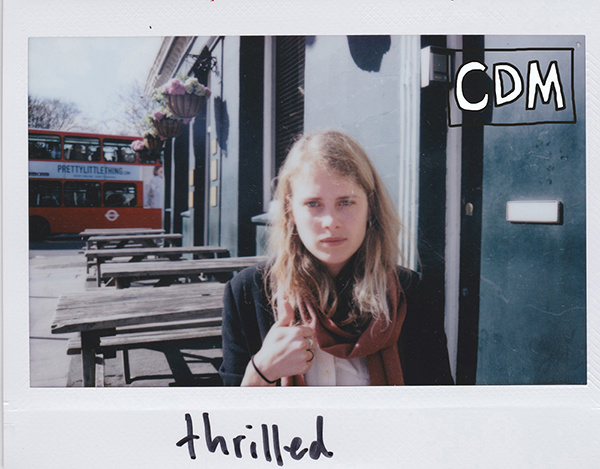
CDM: What’s your writing process like? Are you able to write while on the road, or do you need more focus and sanctuary?
MARIKA: I tend to write in my bedroom, that’s kind of my safe space, my sanctuary. I do find writing on the road really hard, but when I’ve got a guitar backstage, I do start mapping ideas out. I’ll probably never finish a song on the road. But it’s kind of good, because if I go touring for like nine weeks and then I come back and have some time, I’ve built up a lot of ideas, a lot of starting points and I’m itching to write again. So it’s kind of productive in that sense, but it would be great if I could just be writing whilst I’m on the road. But it might change – I mean, my whole writing technique changed with this record. It wasn’t as disciplined, it took a lot longer, it was a lot more sporadic, but I still have a record at the end of it. I’m just trusting in myself that I will be able to do things as and when I need to.
CDM: The Big Moon are your backing band for this record. How did that collaboration come about?
MARIKA: Well, they’re friends of mine. We met, like, a year-and-a-half ago. They were doing a show at The Moth Club [in Hackney] and I went and watched them. We just hit it off and ended up hanging out loads, and have done ever since. I had these songs and I’d arranged them for a band to play. I knew I wanted the record to be more live-sounding and have a bit more freedom in it, a bit more energy. So they seemed like the perfect fit. They have the most incredible live energy, so it kinda felt appropriate. Also, with so much of the record focussing on relationships between women, it was a massive bonus that there’s a very strong female energy running through the record now, because we had four shit-hot ladies playing their instruments amazingly.
MY FAVOURITE THING ABOUT THE BIG MOON IS...

CDM: You’ve talked about how this record is a lot more organic than the first one, with musicians just getting together, pressing record and playing. How did that change the process of recording? Do you think that’s how you’ll continue to record?
MARIKA: I was really nervous about it. It’s very different, because normally I’ll make a demo that might be incredibly built-up, but when I get back in the studio with Charlie [Andrew, producer] we’d strip it back, record the bare bones of the song, and then build into that, [with] lots of playing around and noodling along. [But] this time, I had to know how I wanted it to sound before we even started rehearsing. So there was a lot more prep-work involved, and having to think about drum beats and basslines and everything like that, but that was actually really, really fun. The recording of it was really easy and enjoyable, and I think now that I know I can do that, it’s another string to my bow that I think I’ll definitely do again. Maybe on the next one, or maybe not for the next couple, and then in five years’ time or whatever. But I had a really good time doing it.
CDM: Oftentimes an artist will change producers for a sophomore album, however you’ve continued to work with Charlie Andrew on ‘I’m Not Your Man’. What about your collaboration made you know that he was somebody to keep on board despite the change in sound on this record?
MARIKA: Well, because I know him so well – both as a person and as a producer – I felt really confident that I could bring about change, I could explain what I wanted to him and that he would facilitate that vision. He’s an incredibly diverse producer, and actually prior to making this record, he’d just done a lot of live, heavier-sounding recordings, so that was a really nice coincidence. I know that whatever I want, he will make me have the confidence and feel comfortable to achieve that with him. If I’d come in with a bunch of live-sounding recordings, he wouldn’t have tried to then sit down and tell me it needed to sound more like the last one. I just had full faith in that. I mean, we’ve been working together for like six years now, so it’s just a very strong relationship, and I trust him so much. So I don’t really know why I would’ve changed, because you need to feel confident going into something like that, and he makes me feel confident.
CDM: I really love the first single ‘Boyfriend’. Its light-heartedness and humour is what really seems to make it tick, including the video and the artwork. Do you feel that there’s a sense of humour lacking from the often serious discussions about gender in the music industry?
MARIKA: Well, I think everyone’s discussing it a lot right now. <laughs> Sometimes I think it becomes too much of a focal point and we start getting distracted away from people’s music, because that’s the only thing we really should be focussing on. But I guess we need to have these conversations because there has been an imbalance for a long time. I recognise it more and more in bands at the moment. Maybe that’s just because I’ve got into that scene where I’ve started to see it more, like when you learn a new word and you see it everywhere. But I think it’s an exciting time – everyone’s tackling important issues to do with sexuality and gender. I think there’s a nice way of doing it, to put it into your art rather than having to just talk about it. Also, it kind of just sprung out of me, those lyrics. I don’t really know where they came from. It’s quite a light-hearted, humorous way of dealing with something that’s actually really fucking annoying.
CDM: The line “I’m not your man” comes from ‘Good Intentions’, which feels like a rallying cry for freedom and peace in your life. Why was this the title you chose for the album?
MARIKA: Well, on a very literal level, it’s obviously a record that has, like I said earlier, a lot of very strong female energy on it. And it’s kind of [saying] “I’m not your man, I’m your woman.” But also, because there’s so much relationship and sexual stuff on the record, it can be like, “this relationship isn’t for me, I don’t want to be with you”, or it can be like, particularly in a two-female relationship, “I’m not your man, because I’m your woman.” So if you put that in reference to something like ‘Boyfriend’, it works really well. Like I said when we were talking about ‘Apple Tree’, I was at a point at the beginning of last year where I was really fucking fed up. I left my management and my label, I was just getting to the end of my tether. I was so fucking tired, everything felt like such a big slog. I think [the title’s] a real reflection of the mind-set I was in when I started writing the record, where I was just like, “I’m not your man, I’m out, I’m done.” It encapsulates every theme that’s on there in a different way, which I quite like. It just stood out to me. I always end up with five or six different lyric sections that I’ll look at to pick a title, and that one just jumped out.
CDM: The album artwork, which was created by Tristan Pigott, is super cool. There are so many interesting details in it: the overturned cactus, the slices of apple, the passport photos, the postcard in your shadow. Did he refer to lyrics from the album in creating all these details?
MARIKA: When I asked Tristan if he wanted to do it, and he said yes, I sent him over the record, or what I had at that point: the demos and all the lyrics. Then we went and had many, many coffees and teas in his studio, and we talked through ideas for all the different themes and things that could be on there. It started off with me saying I wanted a group portrait and I wanted [The Big Moon] to be in it, somehow get Charlie in there as well, and include all the people who’d been really important in making it. Then we started digging a little deeper and putting other references in there, because I like it when you have artwork like that, where you can go back again and again and see different things and discover more about the record. There’s references and stuff that he always put in his own work in there, which I really like, because when I work with an artist, even if it’s a commission for my art, the reason I want to work with him is because I like what he does, so I wanted [him] to feel like he had the scope to do that.
CDM: Is that salad cream or mayonnaise you’re putting on the apple slices?
MARIKA: It’s neither.
CDM: Oh. What is it?
MARIKA: It’s moisturizer. To reference the lyric from ‘Boyfriend’: “I like to moisturize!” We were trying to go for that brand of moisturizer with the green cap, but of course without putting any of the branding on it. <laughs>

CDM: I really enjoyed your episodes of Laura Marling’s ‘Reversal Of The Muse’ podcast. It’s so evident from your discussions how supportive and passionate she is about your career. She’s an artist who changed her sound quite drastically between albums one and two, so what has her encouragement meant to you in doing the same?
MARIKA: I mean, she’s just a friend, really. Obviously, it’s not the same as most of my other friends because she’s been through the same stuff. But she’s full of good knowledge and experiences and I’ve heard a few stories that have definitely made me think differently about the way I do things. But generally when we hang out we don’t really talk about music too much, it’s kinda like just normal friend chat. But no, obviously it’s very flattering to have an artist of her calibre being so supportive. I think three years ago it felt more like that because I didn’t know her. But now, you know, it’s Laura. <laughs>
CDM: You talked on ‘Reversal Of The Muse’ about how often you find yourself in an all-male environment in the music industry. You’ve just recorded an album with an all-female backing band. Were there ways that you noticed this changed the studio environment?
MARIKA: Well, it’s a funny one because I’ve only ever really worked with Charlie. It’s just been me and [him] and that’s always been really, really lovely because he’s such a great guy. So in a way for me, it was less about having women in the studio, but just more people. There was a bit more energy flying around. Both [approaches] have been equally enjoyable but it was a lot of fun having a bunch of my buddies in there. Also just the recording of it, playing with a band and all that, because it can get a bit intense doing takes of the same thing over and over again on your own, with Charlie speaking to me through the speakers like, “Again!” But I think I’m the wrong person to ask for that, because I don’t think I’ve had a contrasting enough experience to be able to be like, 'No, all male studios are bad!' It just totally depends who you’re working with.
CDM: So with this process, was it a lot quicker to record the album, with fewer takes?
MARIKA: I think the first session with the girls was like ten pretty chilled-out days. We did four tracks with all the backing vocals and everything. Then we did the next four tracks in two days, which was pretty intense, because Charlie had a very busy schedule, the girls are very busy, so we just slotted it in when we could. And then after that, I think me and Charlie had three weeks of doing the other five tracks and mixing and all of that. So yeah, it was quick, but it was over a much more spread [out] amount of time.
CDM: My favourite section of the podcast was when you and Laura talked about challenging yourselves with what you consume, particularly in the music you listen to. What music were you listening to in order to challenge yourself throughout the writing process?
MARIKA: I’m gonna sound like a massive knob right now. When I’m writing – although having said that, I feel like this might be the same for a lot of artists, and I’m not calling them knobs – I don’t really listen to music. I mean, that maybe could be a challenge for the next one, to actually listen to music while I write! But I kind of turn into a hermit and don’t want too much outside influence. I’ll obsessively listen to demos, trying to hear where things can go, how I can develop my own stuff. I listen to more music when I’m touring. Even right now, I’m not listening to that much music because I’m trying to write the next one. But when I get back on the road, I’ll be listening to a lot more music, hopefully, that will inspire the next record. The challenge for me was not to take myself so seriously, musically. I realised that with my previous output, I would always try to push it into the weirder chord progressions and melodies to shy away from it ever sounding poppy. And actually now, I’ve realised over the last year and a half or so, I fucking love pop music and I don’t know why I was doing that! I just let go. Those more accessible melodies would always be there and then I would change them for fear of people being like, “What’s this lightweight bullshit?” The challenge for me this time was being aware of that and just kind of letting go, and just letting it flow. Once I’d done that for a couple of songs, it suddenly became so much easier and I think I’ve really opened up my style of writing now which is really exciting for where it could go next.
CDM: Were you listening to a lot of pop when you were younger? I always find that people have a pop phase up until their mid-teens, then they shun it, before realising again in their early-to-mid-20s that pop is actually great.
MARIKA: Yeah, I mean, Spice Girls. Britney Spears. I fucking loved it. And then Avril Lavigne – I mean she’s pop, but for me at that age, she wasn’t your conventional popstar, she wasn’t Britney. I found her really fucking cool and got into her in a massive way. And then I guess I started to explore other music. But I’ve always kinda loved it. You know when you hear a fucking good pop song. I mean, yes, the majority of pop music these days is incredibly formulaic. All those chants and things that every song seems to have to have, I can’t deal with that shit. But a well-written pop song? Great. I love it.
CDM: You tell such detailed and engaging stories in each track on this album. Are they always based on fact, or do you mix it up with fiction?
MARIKA: Maybe I shouldn’t reveal too much… <laughs> But no, they’re all very personal. I will always write personal music, because it’s coming from me and nowhere else. I do fully abuse my artistic licence and ramp stuff up a lot. There’s stuff on there like ‘Boyfriend’: I’ve never actually been engaged in a relationship with someone’s girlfriend, bar maybe a few snogs. That was more [about] taking a feeling and a frustration I’d had and pushing it for artistic effect. It’s more fun to listen to, it’s more fantasy. I don’t see why I have to be so autobiographical. All of the beginning intentions and feelings, they are all personal, they all start in a personal place, it is stuff that I have felt or has happened to me. But then I add that extra layer of whipped cream of it being a bit more dramatic and fun.
CDM: Have you written any other forms of fiction, such as poetry or short stories?
MARIKA: I haven’t for a really long time. When I was a child, I was always entering poetry competitions and stuff like that. I used to write short stories and I wanted to be a novelist when I grew up. I always found that I would write these really dramatic – usually very gory – openings to stories and I could never finish them. So I think maybe that’s why I started to veer more towards lyric-writing, because it’s shorter and requires a little less time. But it’s something I would really like to get back to at some point. It’s a confidence thing, probably. I think I just need to hide away and do some stuff without anyone reading it.

CDM: Some of the songs on the album are very clearly about queer relationships, which I think is really important and encouraging to hear. You’ve also talked about no longer wanting to “hide behind a wall” as it prohibits listeners from connecting with you. Was this clarity at all inspired by knowing that there might be young people listening to your music who are questioning their sexuality and want to see their experience represented?
MARIKA: Definitely. I realised that it was important. [It was] a confidence thing. Because if you listen to the first record now, having listened to the second one, it’s very clear that I’m talking about a woman most of the time, but it’s just all hidden behind metaphor. [It’s] in the very nature of being really frank and open in this record. That was just a confidence thing for me. I did feel like it’s the time to be putting stuff out there to make [same-sex relationships] a norm. Like, it’s fine, it’s no big deal that I’ve written a record like this, it is what is, it is me. And hopefully younger people will be able to feel a bit more like it’s a fairly standard thing. I do think that younger generations at the moment are so much more open to identifying as queer, or accepting that other people are, which is really, really great. So I guess it’s just feeding into that. I had an experience: I’d already written the record in that mindset and I was at one of my girlfriend’s shows and a fan came up to the both of us and she said that [we] had both helped her to come out to her parents. She was crying, but in a really amazing way. It kind of validated everything I’d been thinking about this record going into writing it and I was like, I’m really fucking happy that I have been this frank and honest about stuff.
CDM: ‘Blahblahblah’ sheds light on the mass use of technology and everyone being “plugged into the pocket”. My favourite lyric on the track is, “I could try to emulate the braindead but I get sick and tired of the radio buzzing like a hornet in a playpen.” It can be quite hard for songs about this topic to not be overly disparaging and snooty, but you completely pull it off, I think because you make it about your relationship with that way of life. Why was this a topic that you wanted to tackle on the album, and were you consciously trying to not be up on a high horse about it?
MARIKA: I don’t know if that was a conscious thing. I guess I’m not on my high horse about it because I use my phone as much as anyone else. So that just kind of came out in the way that I would talk about it with my friends. It is really scary. I do find it the most terrifying thing at the moment, this dehumanising. It’s really strange. I’d come back from the studio listening to a rough cut of the song, walking from Dalston Kingsland [station in East London] back to my house, and literally everyone I walked past would be on their phones, the lyrics were really resonating. And I was like, oh yeah… <laughs> I wasn’t just ramming that one up. I find it truly terrifying and I thought it would be an interesting topic to write about because it’s an innate fear I have.
MY FAVOURITE SONG ON MY NEW ALBUM IS...

CDM: The album ends on rather a sad note with ‘I’d Rather Be With Them’, but it’s certainly one of the most honest songs on the album. Did you have any reservations about releasing such a brutally frank song about sadness and feeling “hollow inside”?
MARIKA: It is really sad. I think I’m a really overly romantic person and I’m kind of obsessed with love and the breakdown of relationships and how untrustworthy you can become of yourself and how feelings change. So I quite like being really over dramatic about it. It’s the worst fucking feeling in the world when you fall out of love with someone, there’s nothing you can do about it. You still love them, but you’re not in love with them. It’s devastating, and I think so often songs are written from the perspective of someone who’s been broken up with, but it is a whole kind of heartbreak to go through that. So I just decided to go totally overboard with it in a really dramatic way. But it is fucking sad. I think when I perform that song it’s going to make me really, really sad. I haven’t played it yet. I’m holding back on that one. It’s funny as well, because as the last track on the record, I don’t want to leave people feeling really bleak, but there’s actually an arc of a relationship going through the record that was completely unintentional. I’d written all these songs and I put the sequence down as how I thought it worked best, and then I realised that all the songs about relationships start with this intense lush and sexual side of things, and then the jealousy and the breakdown and the ‘I’m out of here’, and just the absolute sadness. I completely didn’t mean to do that. Which is quite funny.

CDM: So you played a small London show last month, and then SXSW in Texas.
MARIKA: Yeah, I did a little secret show at The Old Blue Last with The Big Moon, which was really, really fun. That was the first time we performed. Then I did five shows at SXSW with them as well, which was so much fun. It’s just really liberating playing music like this now, not having to be in that dark place all the time, holding a whole show on your own with just a guitar.
CDM: How did you find playing the new music for the first time?
MARIKA: Just really exciting. I really want people to hear this record. I’m really ready for it to come out now. It’s been a while.
MY BUCKET-LIST...

CDM: If you could travel back in time to the day ‘We Slept At Last’ came out, what piece of advice would you give 22-year-old Marika?
MARIKA: I wouldn’t do anything differently. I think I’d just tell myself that it’ll be okay. Because there were a lot of changes last year. A lot of doubt, but I think that’s a good thing because it means that I’m challenging myself. Actually, you know what, fuck it – I wouldn’t tell myself it’ll be okay, because I needed to go through that struggle and be really fucking scared. I think I’d just be like, “Cool, congrats on the record coming out. Good luck!” <laughs>
CDM: We’d love to have you come and play in New Zealand! Do you have any plans to tour there?
MARIKA: Yes. Definitely. I mean, I’m saying this now, I haven’t spoken to my booking agent or anything like that, but I would really, really love that. I think it’s on the cards, having spoken to some people who work for me around that neck of the woods. It’d be really nice to get to New Zealand. Fingers crossed!


Marika Hackman’s new album 'I’m Not Your Man' is out on June 2nd - click here to pre-order now.
Watch Marika Hackman’s music video for 'My Lover Cindy' below...


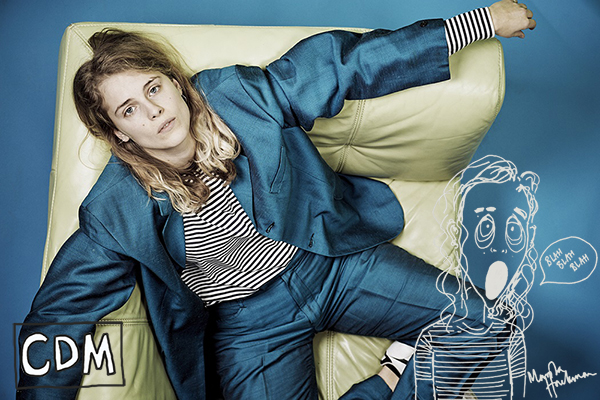
 Marika Hackman
Marika Hackman